Diplomatic Bluebook 2018
Chapter 4
Japan's Diplomacy Open to the Public
1 Proactive Communications to the Public
(1) Providing Information through Domestic Media
MOFA has committed itself to accurately providing information through various media, such as newspapers, television and the Internet in order to gain the understanding and support of Japanese nationals for Japan's foreign policy. The press conferences of the Foreign Minister are open to various media including Internet media and the records and videos of the press conferences are posted on the website of MOFA. On the occasion of overseas or local visits by the Prime Minister or the Foreign Minister, MOFA also provides information from the visited countries/places so that the people can easily follow and understand the processes and outcomes of the visits. In addition, MOFA carries out providing information and making cooperation for media coverage in various forms, which include distribution of information by documents such as MOFA press releases, transmission of information on foreign policy using email newsletters, and interviews of high-level officials of MOFA by newspapers of their respective hometowns.
When factual errors and insufficient information are reported by the media, MOFA submits an appeal for correction, contributes its views, and posts its views on the website of MOFA upon announcement at a press conference. These are all efforts to gain an accurate understanding of Japan's approach and stance domestically and internationally.
(2) Providing Information through the Internet
MOFA's Japanese website, like its English website, swiftly provides information about diplomatic activities of the Prime Minister and the Foreign Minister, as well as the latest news on Japan's foreign policy and international affairs. Moreover, MOFA's Japanese website posts a wide range of contents including “Easy Ways to Understand International Situations,” which explains international situations in simple ways, and “MOFA for Kids” for the students of elementary and junior/senior-high schools.
MOFA provides information through social media platforms such as Facebook, Twitter, and YouTube.
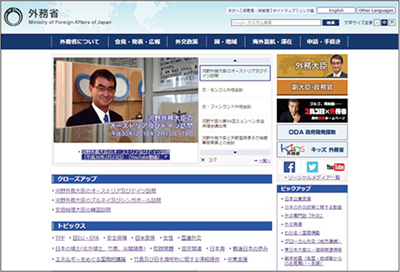 MOFA's Official website
MOFA's Official website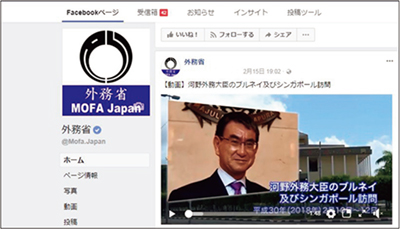 MOFA's Official Facebook Page
MOFA's Official Facebook Page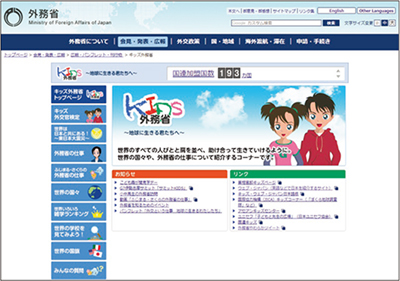 MOFA for Kids
MOFA for Kids(3) Dialogue with Japanese Nationals
MOFA promotes “Public Relations through Dialogue with Japanese Nationals” to provide the people of Japan with an opportunity to directly talk to the Foreign Minister and its officials.
As a part of such opportunities, MOFA holds “Talk to the Minister” to give explanations on Japan's foreign policies and the principles and other themes in which the people have much interest and give candid answers to the questions and opinions of the participants. In 2017, Foreign Minister Kishida visited Kyushu University (Fukuoka Prefecture) in March, Hokkaido University (Hokkaido Prefecture) in April, Kanazawa University (Ishikawa Prefecture) in June, and Kobe University (Hyogo Prefecture) in July as part of the “Local to Global” Project and held the symposium “Dialogue with Foreign Minister Fumio Kishida,” which featured a keynote speech by Foreign Minister Kishida and a panel discussion.
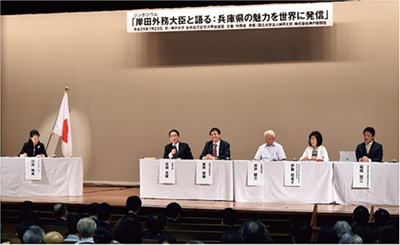 Visit by Foreign Minister Kishida to Hyogo Prefecture under the “Local to Global” Project (July 23, Hyogo Prefecture)
Visit by Foreign Minister Kishida to Hyogo Prefecture under the “Local to Global” Project (July 23, Hyogo Prefecture)MOFA is committed to using various occasions to promote understanding of foreign policies and international affairs. For instance, MOFA organizes lectures by its officials at international exchange organizations, universities and high schools throughout Japan, through “Lecture on the International Situation,” “Diplomatic Talks,” and “Talks for High School Programs.” It also holds the “International Issue Presentation Contest” for university students, and debate sessions between university students and young officials of the ministry through “Dialogue with Students,” as well as providing opportunities for young students to visit MOFA under the program “Visits by elementary, junior and senior-high school students to MOFA.”
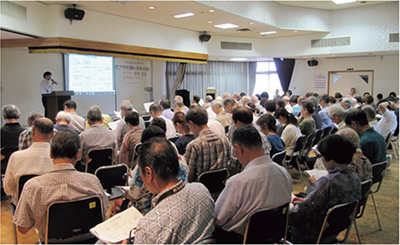 Lecture on the International Situation (September 15, Makuhari Public Hall, Chiba Prefecture)
Lecture on the International Situation (September 15, Makuhari Public Hall, Chiba Prefecture)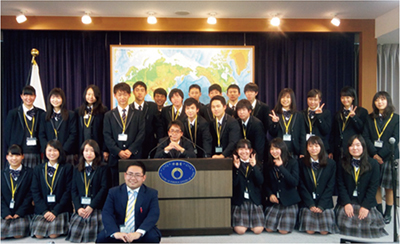 Visits by elementary, junior and senior-high school students to MOFA: Students from Teikyokani Senior High School (Gifu Prefecture) (November 7, Tokyo, MOFA)
Visits by elementary, junior and senior-high school students to MOFA: Students from Teikyokani Senior High School (Gifu Prefecture) (November 7, Tokyo, MOFA)
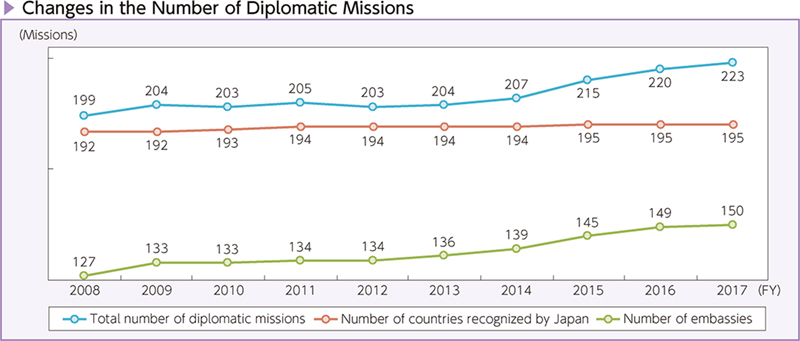
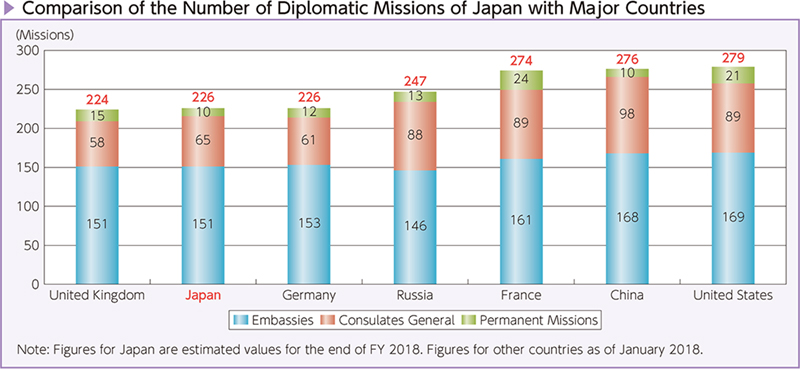
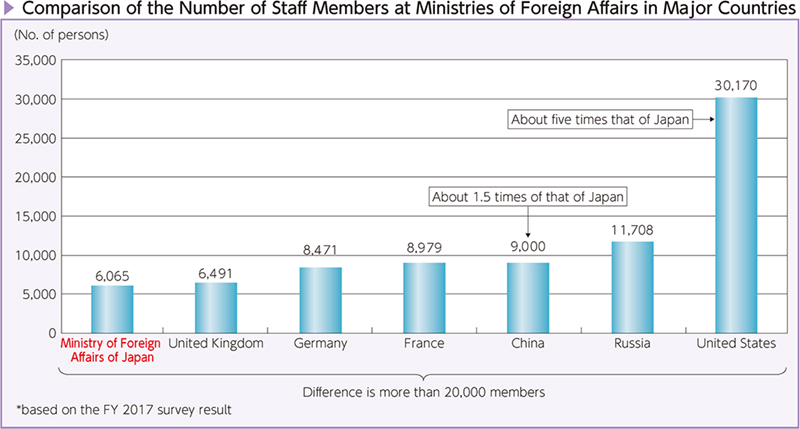
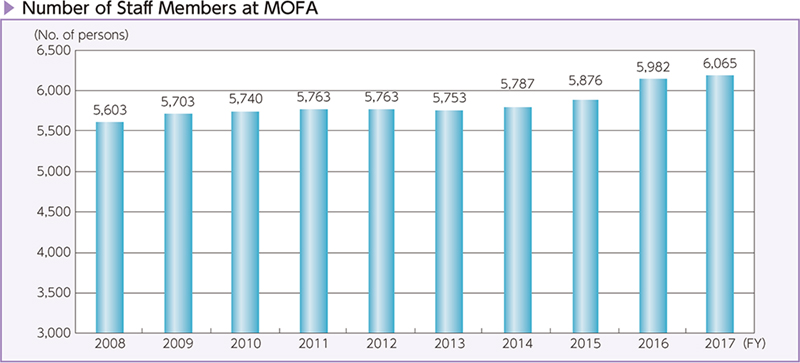
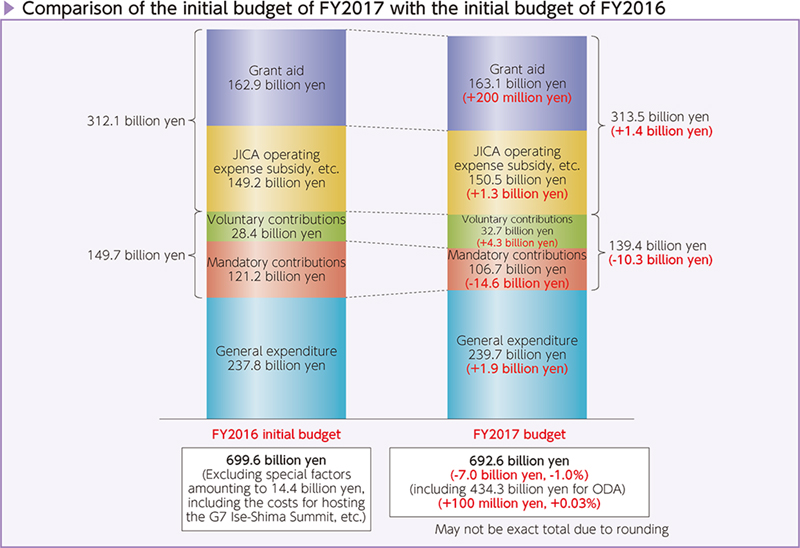
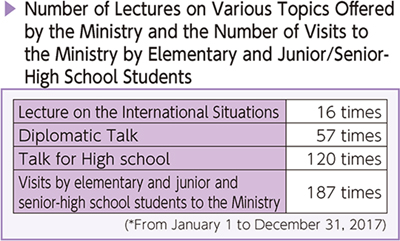
MOFA also introduces Japan's ODA policies and specific measures to the public through various symposia, lectures, and “ODA Delivery Lectures” in which officials from MOFA are dispatched to schools, etc. (40 lectures in 2017).
Additionally, MOFA is sharing discussions taking place in various areas and at various levels concerning diplomacy and international affairs relevant to Japan widely with the public through the publication of the journal "Diplomacy.”
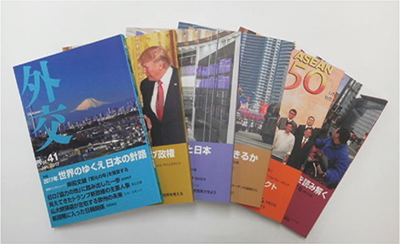 Journal on foreign affairs entitled “Diplomacy”
Journal on foreign affairs entitled “Diplomacy”Moreover, in order to promote further understanding on the organizational structure and foreign policies of MOFA, various pamphlets that explain them in an understandable manner were released. In addition to the above, MOFA surveys public opinion through various forms of media, including the website of MOFA, the website of the Prime Minister of Japan and His Cabinet, and the electronic governmental Public Comment Procedure (“e-Gov”), as well as through telephone calls, fax messages and letters. Opinions and comments gathered from the public are shared throughout MOFA and used as a reference in policy making and planning.
(4) Promotion of the Declassification of Diplomatic Records and the Access to Information
MOFA has voluntarily declassified its diplomatic records at the Diplomatic Archives since 1976. The Rules on the Declassification of Diplomatic Records, which were established in May 2010, stipulates: (1) declassification of diplomatic documents created more than 30 years ago in principle and (2) the establishment of the “Committee for the Promotion of the Declassification of the Diplomatic Records” which is chaired by the Parliamentary Vice-Minister for Foreign Affairs as well as attended by external experts, to further promote the declassification of diplomatic records and improve its transparency. The number of files which has been transferred to the Diplomatic Archives and made public since May 2010 reached approximately 29,000 by the end of 2017.
Furthermore, MOFA discloses information pursuant to the Act on Access to Information Held by Administrative Organs while giving considerations to the national security, the relationship of mutual trust with other countries, the impacts on diplomatic negotiations, and the protection of personal information. In 2017, MOFA received 512 requests for disclosure, and the documents totaling 80,953 pages were disclosed.
